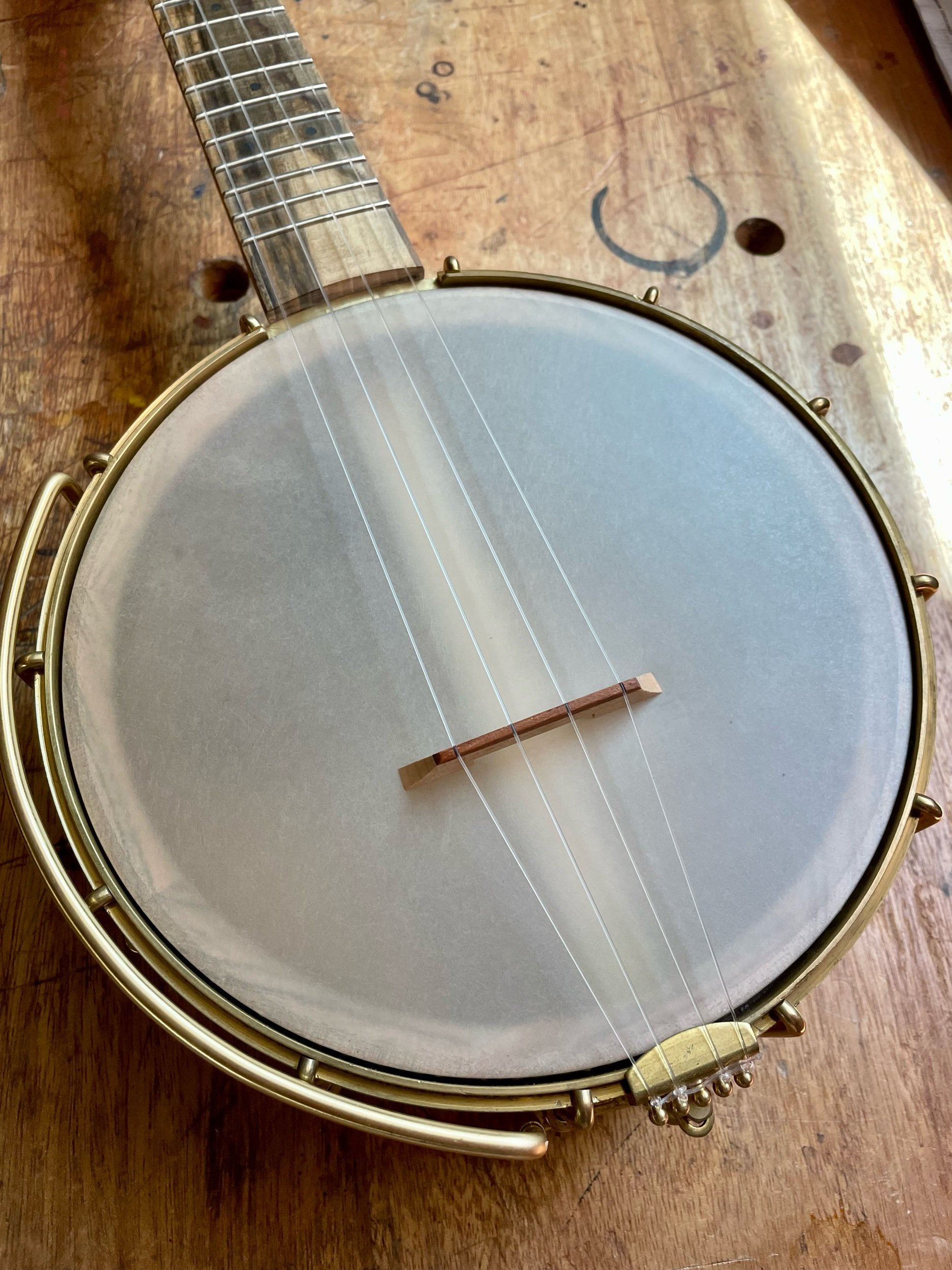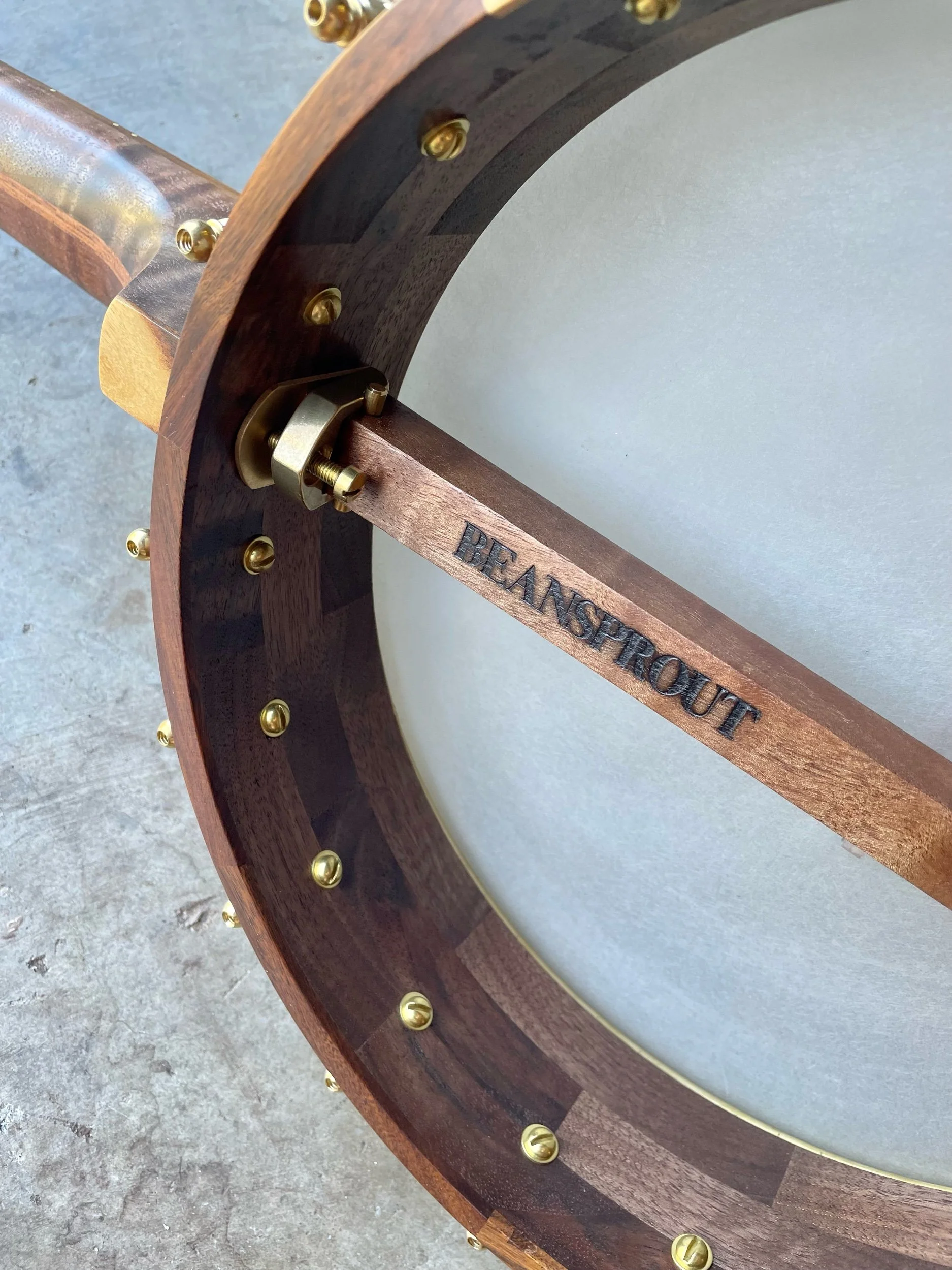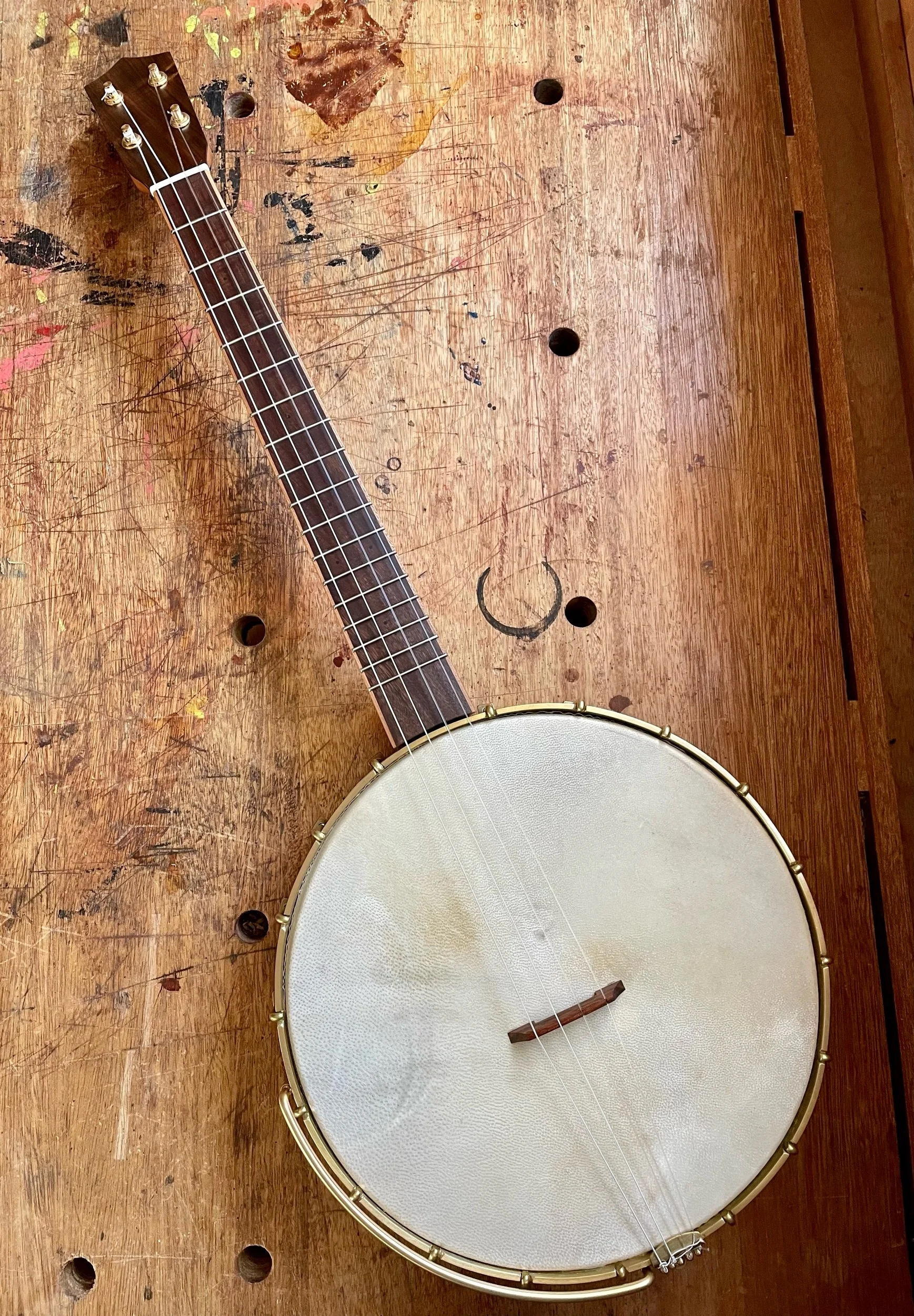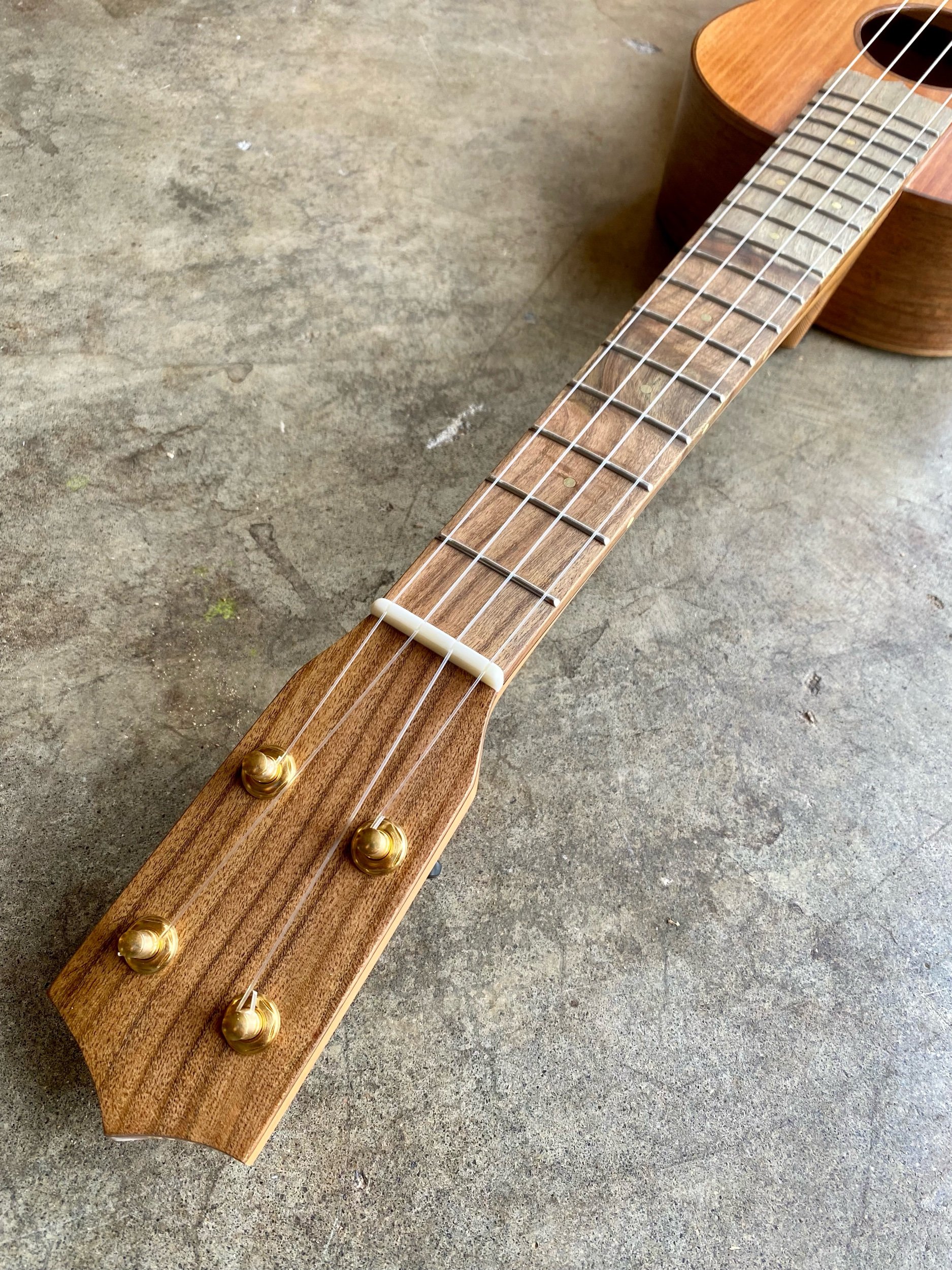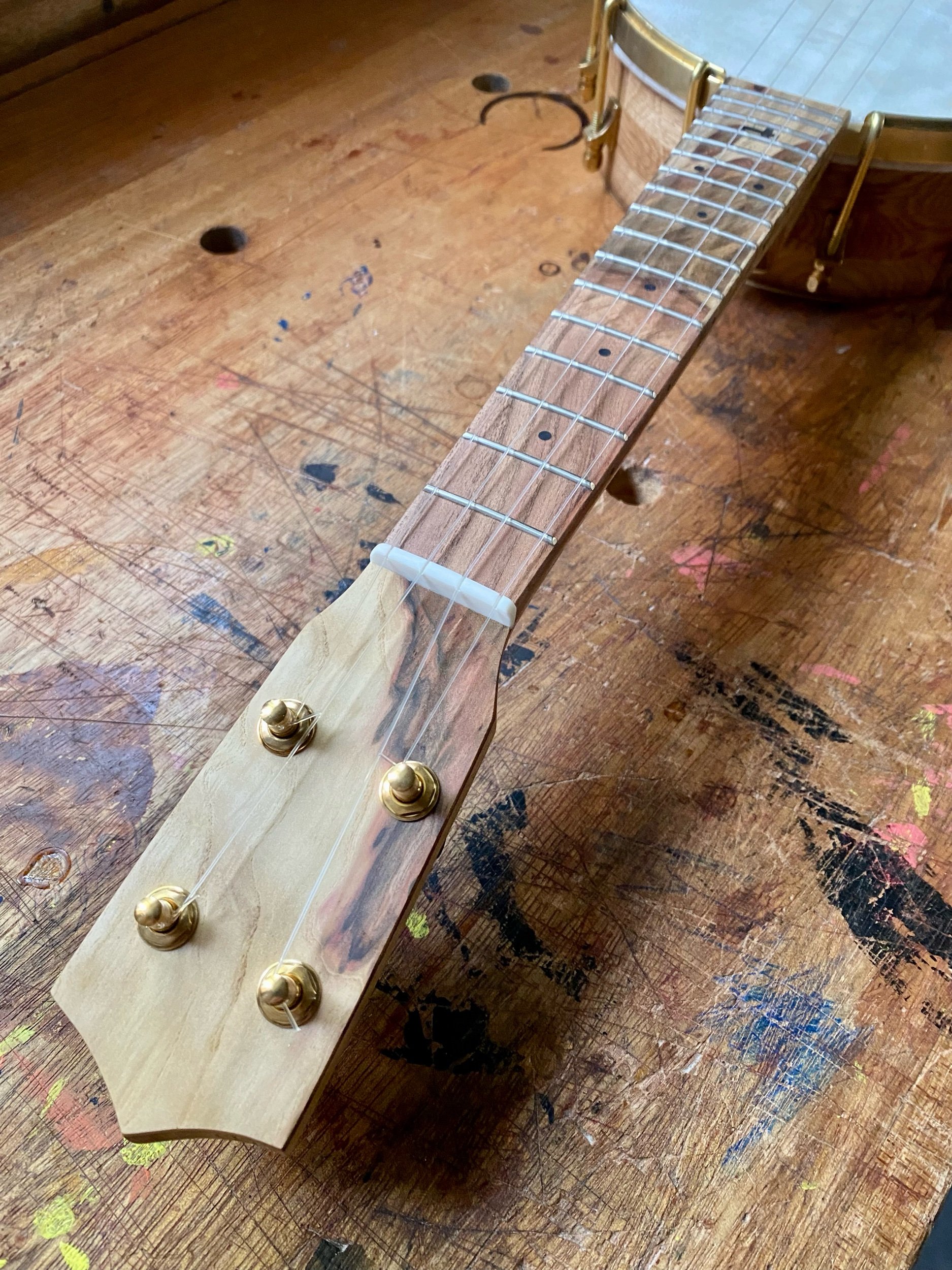“Hi Aaron & Nicole,
I absolutely love my Beansprout #714 Banjolele! I also enjoy the clawhammer book and leather strap. Thank you!
My favorite and the only instrument I currently play is the Beansprout. I practice at least one hour a day and usually close to six hours on the weekends. The quality of the Beansprout is top notch and I love the playability and sound!
Wishing you all the best and very thankful for you!
- D. P. ”
#711- Curly Walnut and Texas Ebony Short Scale Five String Banjo
I love this design and I’m glad customers are responding well to it. 11” rim with a 20” scale five string neck. Small enough to be comfortable and light, big enough to have a nice sound. For this one, we used Curly Walnut from Goby in Portland and Texas Ebony from a retired banjo builder. The brass tone ring adds a little zing to the sound, the brass arm rest adds some comfort and the non steel strings warm it up.
#701- Spruce and Mahogany Baritone Ukulele
Simple materials often make for the best sound and the most dependable instruments. This stock baritone ukulele is a great example. The Engleman Spruce top and African Mahogany back/sides were salvaged from guitar builder’s shops. The neck is a five piece neck from old growth Fir and Walnut. The Pistachio fretboard, head plate and bridge are from California Orchards. A shorter fretboard with 14 frets and some rope binding around the spruce keep it classic and simple. Available here for $1800 plus shipping. If you are overseas, contact us before buying please.
#707- Spruce and Pistachio Alto Ukulele
Pistachio is probably the hardest/densest wood I would choose for a back and sides. It is a great sound reflector, but it’s easy for it to be too heavy. In this case, it just feels/sounds solid! Sitka Spruce from Camp Westwind, Pistachio from California Orchards and a little Spanish Cedar salvaged from a cabinet maker.
#706- Curly Cherry and Texas Ebony Four String Banjo
This Curly Cherry never disappoints me. Rich and sweet, but with a little growl. Plenty of volume but not brash. I love it! This one has a goat skin head, brass tone ring, arm rest and K&K pickup. Ready for the stage or your back porch. The Cherry and Texas Ebony are from a retired banjo builder.
“Aaron & Nicole,
My banjo (#706) arrived on Friday about an hour before I left for a long weekend in the Appalachian Mountains.
It was the perfect introduction to the instrument. I sat on a cabin deck overlooking the deep woods as I explored it. I love how it looks, and I love the sound. I’ve named it Rosie, after my grandmother.
While I know that you’re the woodworker, Aaron, it seems like the two of you work closely together on the overall operation. You’re both very talented!
Thank you!
- R.F.”
#710- Wine Barrel Oak and Pistachio Five String Banjo
White Oak is one of my favorite woods for musical instruments. It looks nice, works easily, is readily available and I love the tone. I think it’s sound has more texture than maple does, a bit gritty or dusty. It is well suited to banjos and ukuleles. This Oak is originally French, salvaged from wine barrels from my neighbors at Hiyu Wine Farm. The Pistachio is from California orchards, harvested when the trees no longer bear fruit. This combo makes for a very sustainable instrument which is closely connected to the food/wine/agriculture industries and makes us feel closer to the region we live in. The Oak pieces show some signs of their last lives as barrel staves, including pieces of oak dowels and some staining from the wine.
#704- Yellow Cedar and Curly Walnut Alto Ukulele
This was a really fun ukulele to put together. A standard model for me, but with lots of tiny details and natural flaws to keep me interested. The Alaskan Yellow Cedar top is from the log we harvested from Camp Westwind, as is the Cedar of Lebanon neck. How that species of cedar made it to Camp Westwind is a mystery to me. The Walnut back and sides is from up the road at The Dee Mill and is the same board as the ukes I’ve built for Dave Matthews recently. Some curly walnut serves as fretboard, headplate and bridge. I bound it with greenish Myrtle and added some bird’s foot purfling to seal the deal. It has a rich but breathy sound and is really fun to play!
#703- Desert Vibes: Juniper and Myrtle Tenor Ukulele
This tenor is a shout-out to three West Coast wood dealers/sawyers with similar values to us: woodfromthewest.com, thedeemill.com and epiloguelumber.com. All three salvage trees that other folks would give up on and turn them into beautiful and useful lumber. Even the scraps are handy to someone like me and these folks keep me well stocked. The Juniper top has a breathy but rich tone, from The Dee Mill. The Myrtle back and sides is from a Portland tree, harvested by Epilogue. The Pistachio fretboard/headplate/bridge is from California orchards from Kevin at woodfromthewest.com.
#694- Port Orford Cedar and Quilted Mahogany Tenor Ukulele
I really appreciate all of the customers, following me on this journey of tradition and innovation. My own mix of old and new is what keeps me excited and this instrument really hits the sweet spot. The back and sides are quilted Mahogany from a classical guitar builder’s estate sale, so is the multi colored “ombré” purfling. The one piece Port Orford Cedar top is from the Oregon coast, via woodfromthewest.com. The Alaskan Yellow Cedar neck was harvested off the beach at Camp Westwind. Everything else is Texas Ebony from a retired banjo builder. I finished it all in amber shellac for an old timey look. But the tone! So rich and smooth, I’m really into it!
“Thank you so much for the wonderful ukulele!
The finish is great. I like the matte look very much. The construction is excellent. The back and sides are excellent and the top grain is perfect. The purfling was a great choice as you said!
String to string very nice and balanced. The pickup sounds great. The tone is excellent. Warm like I would expect with this wood combination. It has a soft warm tone from the cedar.
I am looking forward to it opening up with time. Beautiful instrument I will enjoy for a long time!
- C. G. ”
#705- Port Orford Cedar and Walnut Tenor Ukulele
Another ukulele for Dave Matthews, to match the three I made last year. Port Orford Cedar top from the Oregon coast, local Walnut from The Dee Mill, a salvaged Fir neck and grafted Pistachio California Orchards. The top is stained with tinted shellac and there are big brass fret dots for stage visibility.
#702- Mastergrade Myrtle Soprano Ukulele
Most of my Myrtle comes from Southern Oregon, near the coast. But this tree is from Portland, probably planted as a decorative tree mid 20th century. I got a few boards from the sawyer, https://www.epiloguelumber.com, who specializes in milling urban trees. The grain is wide, but it’s still stiff. The dark markings, curl and figure is fantastic. I have more of it, so just ask and I’ll use it on yours. The neck of this uke is also Myrtle from the same tree. Everything else is Pistachio from woodfromthewest.com.
“Dear Aaron and Nicole-
I love sopranos, and Aaron has knocked it out of the park with this beansprout! The tonality, playability and aesthetics are all superbly executed. It’s truly a wonderful instrument, and I haven’t put it down since it arrived. Thank you for every attention to detail, exemplary customer service, and for bringing joy to so many lives through your crafts. Looking forward to the release of the new clawhammer book as well.
With admiration-
J.K.”
#697- Englemann Spruce and Curly Walnut Alto Ukulele
Louise needed an alto ukulele with a low g, a vibrant sound and easy playability. She has a few specific accommodations for her physical needs, including low action, flat fretboard, low tension strings, thin neck and big white fret markers. Done. The spruce is from a retired guitar maker and the walnut is from Goby in Portland. The Texas ebony is from a retired banjo builder and the spruce for the neck is from my friend Craig. It really sings, I hope it fits her needs!
“#697 is here and I love it. Of course it’s gorgeous, that goes without saying. The headstock is on fire, an amazing surprise for me!
The tone is exactly what I was dreaming of. It’s rich, warm, and at the same time crisp and distinct. Perfect for classical fingerstyle, perfect campanella chimes with great sustain. And I’m getting very noticeable changes of tone depending on where on the fretboard I’m picking. Could not be happier.
It’s a wonderful low-g companion to my beloved high-g Beansprout alto #599. Thank you Aaron for accommodating my flaws and producing these instruments that sing for me.
Love you Keims,
-L. B. ”
#700- Spruce and Curly Myrtle Scout Ukulele
Engleman Spruce from a luthier’s estate sale, curly Myrtle from the scraps of Nicole’s ukulele, a Fir neck from the Carpenter Ant stash and Myrtle fretboard/headplate/bridge from woodfromthewest.com. Sent to a grateful customer in Canada!
#699- Walnut and Pistachio Tenor Banjo Ukulele
A common configuration for me, walnut and pistachio banjo uke, but with two small custom requests: a frailing scoop at the end of the fretboard and a small butterfly inlay on the headstock. The inlay is a new skill that I am working on and it turned out nice, in my opinion. The Walnut is from Vashon island from my friend Cath and the Pistachio is from California Orchards.
#698- Western Red Cedar and Myrtle Alto Ukulele
This is a sweet one. Easy to play, sounds rich and full, feels lightweight but solid and I love the look. Hot tub salvaged Western Red Cedar, Myrtle from the same board as Nicole’s ukulele, Mahogany from the Carpenter Ant stash and Pistachio from California Orchards.
“Hey Aaron, Nicole, and Henry!
We received our Beansprout Alto uke the evening before leaving town on a trip. We only had time to open it up and say WOW…just WOW! The pictures did not do this little gem justice…we are thrilled with how it looks, love all the wood tones and the bird’s foot purfling…Aaron’s excellent craftsmanship shines again!! Since we have been back from vacation and had time to sit down and play, it has fast become our favorite uke. We have eight including the beautiful Beansprout Banjo Uke that y’all made for us in February. As you know all too well, each uke has its own personality, and this one shouts “play me”! It is light as a feather, has a rich and mellow tone for such a little uke, and great sustain too for a small instrument. We love that Aaron put a wound low G string on it. Each note really does ring out like a bell. Hoping one day we can purchase another Beansprout. Thanks again for the caring way you treat your customers. Looking forward to that new Clawhammer Uke book you are working on! :)
-S.M and C.M.”
#695- Curly Walnut and Pistachio Four String Banjo
I love this design. 11” rim and 20” scale, it’s suitable for many tunings and string materials. All kinds of folks have found it useful, which makes me happy. This one is made from Curly Walnut from The Dee Mill and Pistachio from www.woodfromthewest.com. It has a brass tone ring, Renaissance head and a comfortable arm rest.
“Thanks Aaron & Nicole for this beautiful banjo. It arrived today. I’ve been playing it for hours. This will get passed down through the Bastien family for generations to come.
- J. B.
”
#696- Wine Barrel Oak and Pistachio Concert Banjo Ukulele
This beautiful instrument was a nice challenge for me. The customer sent me photos of their favorite beach in Florida, which has a cross on a hill as a landmark. It was fun to pick pistachio and goat skin that wasn’t a literal picture of the beach, but served as the right vibe to invoke it. I inlaid a small ebony cross at the 15th fret to finish it off. The White Oak is from wine barrels I get from my neighbors, Hiyu Wine Farm. It’s French in origin and is beautiful quartersawn material. The Pistachio is harvested from California orchards.
#693- Spruce and Mahogany Scout Ukulele
Spruce top, Mahogany back and sides, Fir neck and Cherry fretboard/headplate/binding. All scraps from other projects. Soprano scale, with geared tuners, strap buttons, bone nut and saddle and fluorocarbon strings. It’s off to the Scout waiting list today.
#675- Juniper and Horse Chestnut Tenor Ukulele
Wow- This one feels so good to play. The whole thing vibrates in the lap and I can tell the sound really sings. This was a collaboration with Chris from The Dee Mill. He dropped off a bunch of scraps over the last couple of years, and I milled and sorted them to be ukulele parts. Many species were new to me, but it was clear what role they could play in an instrument. The top is Juniper from eastern Oregon, which put me in a high desert state of mind, leading me to a color palette and wood layout to fit the vibe. The back, sides and headplate are Horse Chestnut. The neck is salvaged Cypress with a Walnut stripe. The fretboard is Elm, another local wood I had never used. I thought some Walnut would be a good bet for the binding, adding some dark contrast.
Btw, I have more of these woods, drop me a line if you would like a high desert inspired ukulele!
#692- Sycamore Alto Ukulele
Keep it simple. Local wood with sustainable sourcing, easy playability and sweet sound. Sycamore body, Fir and Maple neck and Black Locust fretboard/headplate. The Sycamore is leftover from my time at Mya-Moe and the Black Locust is from up the road at the Dee Mill.





